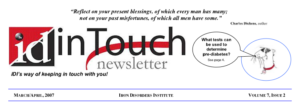Archived Interview with SCTPN Co-Founder Adama Goulbourne, by ID in Touch Newsletter
SICKLE CELL ANEMIA AND EXJADE™
IRON DISORDERS INSTITUTE NEWSLETTER | VOLUME 7, ISSUE 2 | MARCH/APRIL, 2007 Iron Patients – Their Own Stories
I met Claudette Goulbourne, a remarkable lady who has beaten the odds, at a health fair sponsored by The James R. Clark Memorial Sickle Cell Foundation in Columbia, SC. Claudette was volunteering her services that day. I later had the opportunity to chat with her during lunch, and hear her triumphs and challenges as a person with sickle cell disease, and also her thoughts on the Exjade™ clinical trial that she is currently participating in. Meeting Claudette was definitely a pleasure as well as motivation to continue the work needed to educate the minority community on iron related diseases. Sheila Dogan Director, Minority Health Issues Iron Disorders Institute
 I am presently participating in a four-year oral chelation study because of very high iron overload resulting from blood transfusions for sickle cell anemia. Monthly trans-fusions were the solution to relieve years of experiencing acute chest syndrome, which later developed into pulmonary hypertension. It was imperative that I do something to relieve my system of this excess iron be-fore the iron damaged any of my organs.
I am presently participating in a four-year oral chelation study because of very high iron overload resulting from blood transfusions for sickle cell anemia. Monthly trans-fusions were the solution to relieve years of experiencing acute chest syndrome, which later developed into pulmonary hypertension. It was imperative that I do something to relieve my system of this excess iron be-fore the iron damaged any of my organs.
My physician suggested using a Desferal® infusion for removing the excess iron. My thinking at that time was that Desferal® was invasive and too time consuming. My physician continued to stress the danger that existed because of high iron level. I was later informed about a study by Novaritis for the oral chelation ICL670, which seemed much more reason-able to work with because it is taken orally rather than intravenously.
I realize that every study has its pros and cons, which must always be considered. Some of my concerns were changes in vision, hearing, and possible kidney and liver damage. I have noticed that over the years I have been in the study there have been changes in my vision and hearing.
I am tested every six months to determine if organ damage has occurred from the Exjade™. My weight is measured so that the appropriate dose of Exjade™ can be administered. Additionally, I have monthly blood work to measure decreases in iron.
I know I have benefited from this study because my iron overload [ferritin] has decreased more than two thousand points. However, because I must continue with chronic blood transfusion, my concern is whether my ferritin level will be normalized. The “side effects” are what I like least about the study. However, sometimes it seems like a double edged sword – one must take this to treat one problem but what can develop from taking it? Four or five other problems! Maybe! The FDA has finally approved Exjade™ for treating sickle cell patients who are suffering from iron overload. Although Exjade™ has been approved, the study is ongoing. All the patients in the study are given the option to continue, and I have chosen to remain on the study. This is the only way I can determined what the long term effects will be when this has been accomplished, so that many more patients will benefit. V
VISIT THESE WEB SITES TO LEARN MORE ABOUT SICKLE CELL ANEMIA The James R. Clark Memorial Sickle Cell Foundation http://www.midnet.sc.edu/jrcsc/ The American Sickle Cell Association http://www.ascaa.org
Follow SCTPN on Twitter & IG @SCTPN FB @SCTPNWalk & @SCDThalPatientsNetwork #1ViralVoice

